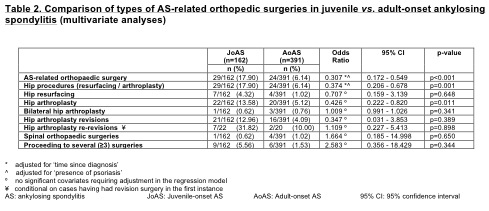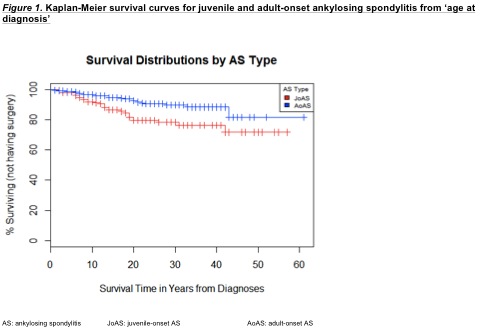Session Information
Session Type: Abstract Submissions (ACR)
Background/Purpose: Juvenile-onset ankylosing spondylitis (JoAS) and adult-onset ankylosing spondylitis (AoAS) are subtypes of ankylosing spondylitis (AS) that may have different clinical outcome. We compared cohorts of JoAS and AoAS in terms of: (1) clinical characteristics; (2) clinical outcomes; (3) proceeding to and types of AS-related orthopaedic surgery.
Methods: A cohort study was conducted of all patients attending a dedicated AS clinic in a teaching hospital. Patients aged ≤16 years at symptom onset were categorised as JoAS, and ≥17 years as AoAS. Demographics, clinical parameters, composite indices ≤6 months of census, biological use, and history of AS-related orthopaedic surgery to the spine, root or peripheral joints were recorded. Univariate, multivariate logistic regression, and survival analyses were performed.
Results: 553 AS cases were studied: 162 JoAS; 391 AoAS. On univariate analyses (Table 1), no statistically significant differences were found between JoAS and AoAS in terms of HLA-B27 positivity, smoking, occurrence at any time of inflammatory bowel disease, psoriasis, enthesitis, or uveitis. JoAS cases had higher scores for two Bath AS Functional Index (BASFI) domains: bending forward from the waist (p=0.03); doing physically demanding activities (p=0.04).
On multivariate analyses adjusted for significant covariates (Table 2), compared to JoAS cases the AoAS cases were less likely to have: proceeded to surgery (odds ratio, OR 0.31; p<0.001); had a hip procedure (resurfacing or arthroplasty; OR 0.374; adjusted p=0.001); had a hip arthroplasty (OR 0.43; adjusted p=0.01). JoAS and AoAS were equally likely to have had hip resurfacing, bilateral hip arthroplasty, hip arthroplasty revision, hip arthroplasty re-revision, spinal orthopaedic surgery, and several (≥3) procedures.
Kaplan-Meier survival curves (log-rank test p=0.001) and Cox regression also demonstrated a significant difference in not having surgery between JoAS and AoAS (p=0.002) (Figure 1). A history of smoking was not associated with surgery. AS cases with older age at symptom onset were far less likely to have surgery than those with younger onset, in a non-linear manner.
Conclusion: JoAS are more likely than AoAS cases to proceed to AS-related orthopaedic surgery, especially hip resurfacing and arthroplasty.
Disclosure:
D. R. Jadon,
None;
G. Shaddick,
None;
A. Jobling,
None;
A. V. Ramanan,
None;
R. Sengupta,
None.
« Back to 2014 ACR/ARHP Annual Meeting
ACR Meeting Abstracts - https://acrabstracts.org/abstract/progression-to-and-type-of-orthopaedic-surgery-in-juvenile-vs-adult-onset-ankylosing-spondylitis/



